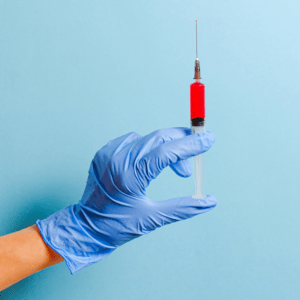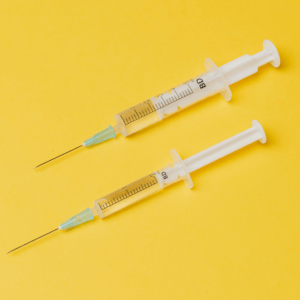 Depo-Provera is a popular form of birth control. However, long-term side effects of Depo-Provera include meningioma brain tumors and loss of bone mineral density.
Depo-Provera is a popular form of birth control. However, long-term side effects of Depo-Provera include meningioma brain tumors and loss of bone mineral density.
Lawsuits currently allege that Depo-Provera causes meningioma brain tumors, alleging that the drug’s manufacturers knew or should have known about this risk but failed to warn about the danger.
Call us today for a free consultation, text us from this page or fill out this page’s free case evaluation form if you or a loved one has been diagnosed with a brain tumor after using Depo-Provera. We won’t charge any fee to handle your Depo-Provera birth control shot case until and unless we recover compensation for you.
Depo-Provera Side Effects Overview
The Depo-Provera shot, or depot medroxyprogesterone acetate, has been linked with numerous, long-term side effects, including brain tumors, menstrual irregularities, liver issues, urinary tract infections, cardiovascular health changes, bone density loss, mental health changes and weight gain.
Long-Term Side Effects of Depo Provera
Brain Tumors and Meningiomas
According to the British Medical Journal, when Depo-Provera injections are received for over one year, the risk of developing an intracranial meningioma is increased by 5.6 times.
Call us today for a free consultation if you or a loved one was diagnosed with a meningioma after using the birth control method Depo-Provera.
Menstrual Irregularities
Some women experience menstrual cycle changes. This can include lighter periods, irregular menstrual cycles, heavier bleeding or a complete lack of periods when using Depo-Provera long-term.
Liver Issues
Depo-Provera may cause liver damage. This can include liver tumors, acute liver injury and jaundice. The drug is not recommended for women who have significant liver disease.
Urinary Tract Infections
The use of Depo-Provera may increase some women’s risk of developing urinary tract infections. This is because of hormonal changes the drug causes which might affect bladder muscles’ tone and the function of the urinary tract. The drug can relax the urinary tract’s muscles, possibly leading to incomplete emptying of the bladder, and thus higher susceptibility to bacteria, which can cause infections.
Cardiovascular Health Changes
Depo-Provera has been linked with numerous changes in cardiovascular health, including stroke, heart attack and an increased risk of blood clots and thrombotic events like deep vein thrombosis.
Bone Density Loss
One of the most significant long-term concerns with Depo-Provera is bone density loss. The drug can suppress levels of estrogen, and these levels are important for bone health. The loss can be especially concerning for young women who have yet to reach peak bone mass. The drug can increase the risk of osteoporosis or fractures. The osteoporosis risk will increase as Depo-Provera is used longer, especially in people who drink a lot, smoke or have additional risk factors. The effect is stronger in women who have reached menopause.
Mental Health Changes
Depo-Provera may cause mental health changes such as depression, mood swings or anxiety.
Weight Gain
Women women might experience weight gain or increased appetite while using Depo-Provera.
Etc.
Additional potential long term effects of Depo-Provera include vision issues, convulsions, delayed fertility upon stopping use, and a higher risk of breast cancer.
Other Side Effects
 Depo-Provera may cause additional side effects which usually don’t require medical attention. They might go away while your body adjusts to the drug. Your doctor might be able to inform you regarding how to reduce or prevent some of the side effects. These side effects include:
Depo-Provera may cause additional side effects which usually don’t require medical attention. They might go away while your body adjusts to the drug. Your doctor might be able to inform you regarding how to reduce or prevent some of the side effects. These side effects include:
- Skin blemishes
- Discouragement
- Thinning of hair or hair loss
- Feeling empty or sad
- Irritability
- Increased hair growth, particularly on your face
- Loss of pleasure or interest
- Lack of appetite
- Acne
- Nervousness
- Tiredness
- Unusual drowsiness or sleepiness
- Trouble sleeping
- Trouble concentrating
- Weight changes
You should always check in with your medical provider if you feel it is necessary or are excessively bothered by a side effect.
Additional side effects can include:
- Nausea
- Headache
- Breast tenderness
- Abdominal pain
- Allergic reactions, such as swelling, hives or rash
- Neurological problems like memory loss or seizures
- Decreased libido
Side Effects After Stopping Depo-Provera Use
Some side effects of the drug can persist after use of the drug is stopped. As an example, irreversible, long-lasting declines in bone mineral density can occur. This can lead to a higher risk of fractures and osteoporosis.
The drug may also lead to blindness or permanent visual disturbances which won’t resolve after the drug is no longer taken. It can also take months before fertility levels return to the levels they were before the drug was taken.
Women can develop meningioma brain tumors up to decades after taking the drug.
Every body is unique and can react uniquely to medication-induced hormonal changes. The side effects of the drug can linger for years. Talk with your doctor if you’re taking or have taken the drug and are concerned about how your body has been impacted or may be impacted by it.
Who Is Eligible for a Depo-Provera Lawsuit?
Call us for a free consultation if you or a loved one meets the following criteria:
- Use: You need to have used Depo-Provera or a generic, authorized version at least two times.
- Diagnosis: You need to be diagnosed with a meningioma spinal or brain tumor, vision problems, seizures, headaches, bone density loss or osteoporosis following use of Depo-Provera
- Additional factors: The date of your last use of the drug and your diagnosis date will play a factor.
Call us today for a free consultation if you are unsure if you qualify.
FAQs
How Long Do Depo Shot Side Effects Typically Last?
The drug’s side effects will typically disappear within two to three months. The reason for this is that your body will adjust to the shot’s hormones.
Can Depo-Provera Cause Permanent Infertility?
The drug cannot cause permanent infertility. The drug, however, can reduce fertility temporarily for as long as one year after usage is stopped.
The drug is a hormonal contraceptive which prevents ovulation and gets injected once every three months. Once you stop the drug, it may take as long as 24 months for a period to return. Most people have a period within 12 months, though.
If you want to get pregnant:
- Stop use of Depo-Provera
- Consider taking prenatal vitamins
- Get an appointment for a pre-conception check-up
- Discuss issues such as hormonal problems or low egg supply with a doctor
What Happens If You Take Depo-Provera For More Than 2 Years?
It is not recommended to take Depo-Provera for longer than two years. Prolonged use of the drug can lead to numerous possible side effects, such as decreased bone density, irregular menstruation, a higher risk of breast cancer, mood changes, weight gain, fatigue, heacahe, and meningioma brain tumors.
Depo-Provera’s manufacturer recommends limiting use of the drug to two years at most. When women need to keep using the drug for a longer period of time, it’s vital for them to consult with healthcare professionals to discuss benefits and risks and monitor for side effects.
There are alternatives available for women who need to utilize contraception for longer than two years, such as condoms, intrauterine devices or hormonal birth control pills. Talk to your doctor about the right birth control method for you. It is important to note that Depo-Provera fails to protect you against sexually transmitted infections.
Does Your Body Go Back to Normal After Depo?
Yes, the body eventually returns to normal after you stop taking Depo-Provera. However, it may require several months before your body readjusts to hormonal changes.
What you can expect:
- Bleeding: You may experience irregular bleeding or spotting while your body adjusts.
- Ovulation: It may take as long as six months for your ovulation to return to normal. It may take longer for some people.
- Side effects: You may experience side effects such as mood changes, breast tenderness, bloating or headaches.
- Fertility: It may take as long as 10 months before you are able to become pregnant again.
Contact a doctor if:
- Your period has not returned after a total of three months
- You wish to conceive within a year
- You have concerns regarding side effects
What Does Depo Do to Your Body?
The contraceptive injection Depo-Provera prevents pregnancies by thickening cervical mucus and suppressing ovulation. It thins the uterus’ lining as well.
How Depo-Provera works:
- Hormone production: The drug contains a hormone known as progestin. This signals your body to stop producing hormones.
- Ovulation: Ovaries are prevented from releasing eggs by Depo-Provera.
- Cervical mucus: Cervical mucus is thickened by Depo-Provera, which makes it hard for sperm to reach eggs.
- Uterine lining: The uterus’ lining is thinned by Depo-Provera, which makes it difficult for eggs to attach.
Contact a Depo-Provera Lawyer Today
 Call us today for a free consultation if you or a loved one has been diagnosed with a meningioma after using the birth control Depo-Provera. We can help you recover financial compensation for damages related to your meningioma, including medical bills, lost wages, pain, suffering, wrongful death and more.
Call us today for a free consultation if you or a loved one has been diagnosed with a meningioma after using the birth control Depo-Provera. We can help you recover financial compensation for damages related to your meningioma, including medical bills, lost wages, pain, suffering, wrongful death and more.
We have been handling dangerous drug lawsuits since 1990 and have recovered over $750,000,000 for our clients. Our vast experience in handling defective medication cases like yours will allow us to recover the most money possible for you.
We are contingency fee dangerous drug lawyers so we won’t charge you any fee until and unless we recover compensation for you. Our only fee to handle your Depo-Provera case will be a percentage of any compensation we recover, so you won’t ever owe us an upfront fee or any money out of your own pocket.
Call us today for a free consultation.

